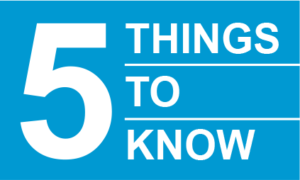MEDI-CAL ELIGIBILITY FOR NEW UKRAINIAN ARRIVALS: The Department of Health Care Services (DHCS) has released a Medi-Cal Eligibility Division Information Letter to provide guidance to counties on the Medi-Cal eligibility of Ukrainian nationals arriving in California. It is anticipated that a significant number will resettle in California. The federal government has not provided any special benefit eligibility for this population, but has authorized the use of Temporary Protected Status (TPS) for Ukrainian arrivals who qualify. Many of the Ukrainian arrivals may enter under TPS or as humanitarian parolees and may not be eligible for the traditional federal services offered to immigrants granted refugee status. However, they may qualify for state-funded programs, including state-funded full-scope Medi-Cal. The letter provides guidance on how to establish Medi-Cal eligibility for this population (based on current Medi-Cal policy) for state and federal Medi-Cal benefits. DHCS will work closely with the state Office of Refugee Health and stakeholders to ensure that new Ukrainian arrivals receive the Medi-Cal benefits to which they are entitled.
NATIONAL HOSPITAL WEEK: HASD&IC worked with the County of San Diego Board of Supervisors to have the county building on May 9 lit up in blue and white in honor of National Hospital Week, May 8-14. If you’re in the area, members are encouraged to stop by and take a look. National Hospital Week is a time to highlight hospitals, health systems, and health care workers and the innovative ways they are supporting and connected to their community. CHA is also hosting an event with California’s state senators and Assembly members on the State Capitol grounds on May 9. This is an opportunity to lobby elected officials on HASD&IC and CHA’s top priorities. CEOs and government relations executives should have received an email about the event. More details are available on the CHA website.
ADDRESSING THE NEED FOR MIGRANT SHELTER: Last week, the County of San Diego approved a temporary shelter policy for the anticipated increase of individuals and families who will be seeking asylum. The board also approved seeking out state and federal reimbursements to pay for shelter services. In addition, the creation of a subcommittee will address both short- and long-term solutions for the influx of migrants entering San Diego County to ensure better coordination amongst different government agencies, non-governmental organizations, and local jurisdictions.
RURAL FLOOR COURT RULING: On April 8, a U.S. District Court issued a decision in Citrus HMA, LLC d/b/a Seven Rivers Regional Medical Center, et al. v. Becerra in favor of hospitals challenging the Centers for Medicare & Medicaid Services (CMS) policy that excludes wage data of urban-to-rural reclassified hospitals from the rural floor calculation. The ruling has favorable implications for similar litigation CHA is sponsoring on behalf of members. Specifically, CHA’s litigation challenges the application of CMS’ rural floor policy for federal fiscal year 2020, which cost California hospitals approximately $123 million. Additional details on the implications of the recent ruling on CHA’s litigation are available in this CHA News article.
988 CRISIS CALL CENTER SERVICES: On April 19, the Department of Health and Human Services, through its Substance Abuse and Mental Health Services Administration (SAMHSA), awarded nearly $105 million in grant funding to 54 states and territories in advance of the July transition to the 988 number for the National Suicide Prevention Lifeline. The California Department of Health Care Services received nearly $14.5 million to improve response rates, increase capacity, and ensure calls are quickly routed to local call centers for people in need, and may also use the funding to build the workforce necessary for enhancing local text and chat response, working with the California Lifeline call center network. For the County of San Diego, beginning in July 2022, the National Suicide Prevention Lifeline (800-273-8255) will transition to 988 — an easy to remember three-digit dialing, texting, and chat code for anyone experiencing a suicidal or mental health crisis. Once 988 goes live, the calls will be routed into the Access and Crisis Line. More information is available on the SAMHSA website.
